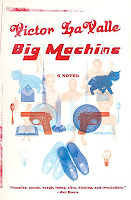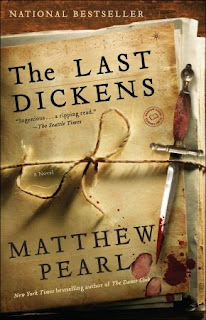
The Big Machine, Victor Lavalle's second novel and third book, is a brilliant exploration of class, race, doubt and faith. This is all covered through the story of Ricky Rice, a recovering heroin addict who, at the beginning of the story, is cleaning a bus stop bathroom in Utica NY. He receives a mysterious envelope with a note that references a promise he made in the past and a bus ticket to Burlington, VT of all places. From there he gets recruited into an organization known as "The Unlikely Scholars" who work for the Washburn Library. From the first page, the story develops a vibrant weirdness as you learn that Ricky's new job is to scan newspaper articles for evidence of a "Voice", that he was raised in and is the lone survivor of a radical Christian cult, and that he and the mysterious Gray Lady must team up against the messianic Solomon Clay. Lavalle has a brilliant ear for detail and is able to invest this wild and weird story with the pace of a page-turning thriller. Below is an interview with Victor Lavalle.
Ricky Rice is a recovering heroin addict. What do you think the recovering addict as hero can teach our society?
It's important that Ricky has a rough past--heroin addiction, petty crime, survivor of a religious cult--because I wanted to write a book about second chances. I can never really get into the books with heroes or heroines who've never done one thing wrong in their lives. Always virtuous, always kind. Even Jesus lost his temper once in a while!
So in the case of Ricky I wanted to write about the kind of person that many would think can never be redeemed. A person who's messed up so often that it's just become the norm. He and the Gray Lady have both hurt themselves and others in countless ways, but they work hard to turn their lives around during the course of this novel. And if folks like them can do it, then maybe readers will feel like they've got a little more incentive to change their lives for the better too. I know it sounds a little cheesy, but I think it's great when a serious piece of literature also offers readers some hard won optimism.
Do cults, whether fictitious like the Washerwomen (and to an extent The Unlikely Scholars) or real teach us anything universal about humanity or human society?
Human beings like to join groups. Human beings need community. Hell, even those totally anti-social teenagers at the mall all hang out in a clump while they glower at the rest of us and dismiss us as sheep! So if it's a natural human impulse then the real question is about when is that impulse good for us and when is it destructive? Sometimes the distinction isn't so easy to make. Even good institutions, wonderful groups, can be warped by bad leadership. And even groups that are dismissed as strange or even evil can offer profound wisdom to the rest of us. I wanted to write about two people, a man and a woman, who find themselves in this kind of tug of war. And I hoped that their struggle might reflect the very personal struggles each of us faces from time to time and even the kind of struggle that whole societies encounter.
One of the Washerwomen concludes a chapter by saying, "Doubt is the big machine. It grinds up the delusions of women and men." What is our society's relationship to doubt? Is there a politics of doubt or a spirituality of doubt?
I've been very happy that people have locked on to that saying, that idea. Partly because it's one of the central ideas of the novel, but also because it allows us to have a discussion about what doubt actually means. I like to think that doubt is one of the greatest tools we have as we try our best not to be swayed by chaos and insanity in this world. Some folks think of doubt as a negative, no other way to interpret it, but I just think they're wrong.
If there's a politics of doubt or a spirituality of doubt it might be summed up as: you've got common sense, don't you? Well use it! And not just on what others say, but on what we think/presume we know about the world as well. There are so many assumptions I was raised with, ideas that I took on as my own simply because people I loved told me they were true. But as I got older, I had to learn to make up my own mind. And sometimes I had to discover that the things I'd been taught were just incorrect. I had to doubt even some of my most basic beliefs and then go out and form my own. It's difficult work, but worthwhile.
Do you believe there is a "Voice" of some kind whose statements can be discerned by observing the world?
There's a great book I read a while ago called The Roots of Christian Mysticism. It's by Olivier Clement. The book is really a kind of anthology, collected writings of early Christian mystics. There's one line that jumped out at me when I first read it and stayed with me ever since: the universe is the first Bible.
I know how that's going to sound to some folks! More traditional Christians will see it as some kind of slander against the "real" Bible and people who have no stomach for religious conversation will roll their eyes and say, Why does he have to bring this nonsense up? But the heart of my novel is about wrestling with questions exactly like the one you've asked. I'd like to think that this book is, in part, a long narrative that tries to answer that question. I do believe there is a voice. The trick is for me to shut up long enough that I might actually hear it. I'm still working on that part.
There has been a lot of press about the year in publishing, with dozens of major authors all publishing books within weeks of each other. Do you think this has been good for books, bad for books, or something else?
I can't speak for the business side of things because I don't have that kind of access. I can only speak about how the year, particularly the second half of the year has been for me. My publisher slated Big Machine for release in late August and I thought this was a great idea. A chance to catch the last of the summer readers and to get a jump start on the fall. Plus, it had been about seven years since my last novel, The Ecstatic, so I was excited to get this novel out there, reintroduce myself.
Then I got the news that this little writer named Thomas Pynchon was coming out with a novel about a week before mine. And that a few other folks were going to be publishing in the fall too: Lorrie Moore, Jonathan Lethem, E.L. Doctorow, Margaret Atwood, Richard Powers. At a certain point I expected to hear that Ralph Ellison had risen from the grave because he'd finally finished up his second novel in the afterlife and he just had to share it this fall!
In other words, part of me worried that the trumpet blasts for all these folks were going to drown out my own. But, I'm a stubborn bastard. And I had a lot of faith in my novel. I felt like it could take on all comers. Nevertheless, I admit I held my breath. So the fact that you're talking with me now, talking about my book, many months after it came out is part of why I've been breathing easier. The year has been great because Big Machine folks have been digging it. Each time someone tells me they picked up the book because some friend read it and loved it I'm reminded that word-of-mouth is a gift. One I deeply appreciate. Big Machine is the wildest book published this year and that could've been a real weakness, but happily that's turned out to be one of its greatest strengths.
I hear you're going to Antarctica. What will you be doing there?
I'm going to Antarctica with my girlfriend. She's a writer as well. Her name is Emily Raboteau. She's working on her next novel and a portion of the book takes places on an ice breaker in Antarctica. She's the adventurous type so rather than just research the experience she decided she wanted to experience the experience. And, lucky me, I get to tag along. So she'll be taking notes for that book and I'm planning to work on a short novel that I plan to be done with early in 2010. But most of all we'll just be trying to appreciate the fact that we're enjoying such a rare and unlikely trip.
What books are you going to bring with you?
I'm trying to plan that out now, actually. I'm going to be bringing a whole load of Ambrose Bierce, including a biography called Ambrose Bierce: Alone in Bad Company. I'm working on an essay/appreciation about the man--one of my literary heroes and look forward to the chance to dive in. Also The New Oxford Annotated Bible. I've never read the Bible straight through but about a year ago some very smart people suggested I should. Why would you put your faith in something you haven't actually read? That was the idea. They said to try a chapter a day so it wouldn't be so daunting and I've been trying. So far I'm up to Deuteronomy so I've got a ways to go! I'd like to knock out a couple of books while I'm sailing toward the Antarctic Peninsula.















